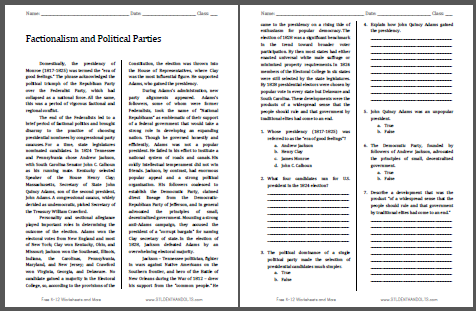| Factionalism and Political Parties Reading with Questions |
|---|
| www.studenthandouts.com ↣ American History ↣ American History Readings |
Domestically, the presidency of Monroe (1817-1825) was termed the "era of good feelings." The phrase acknowledged the political triumph of the Republican Party over the Federalist Party, which had collapsed as a national force. All the same, this was a period of vigorous factional and regional conflict.
 The end of the Federalists led to a brief period of factional politics and brought disarray to the practice of choosing presidential nominees by congressional party caucuses. For a time, state legislatures nominated candidates. In 1824 Tennessee and Pennsylvania chose Andrew Jackson, with South Carolina Senator John C. Calhoun as his running mate. Kentucky selected Speaker of the House Henry Clay; Massachusetts, Secretary of State John Quincy Adams, son of the second president, John Adams. A congressional caucus, widely derided as undemocratic, picked Secretary of the Treasury William Crawford.
The end of the Federalists led to a brief period of factional politics and brought disarray to the practice of choosing presidential nominees by congressional party caucuses. For a time, state legislatures nominated candidates. In 1824 Tennessee and Pennsylvania chose Andrew Jackson, with South Carolina Senator John C. Calhoun as his running mate. Kentucky selected Speaker of the House Henry Clay; Massachusetts, Secretary of State John Quincy Adams, son of the second president, John Adams. A congressional caucus, widely derided as undemocratic, picked Secretary of the Treasury William Crawford.Personality and sectional allegiance played important roles in determining the outcome of the election. Adams won the electoral votes from New England and most of New York; Clay won Kentucky, Ohio, and Missouri; Jackson won the Southeast, Illinois, Indiana, the Carolinas, Pennsylvania, Maryland, and New Jersey; and Crawford won Virginia, Georgia, and Delaware. No candidate gained a majority in the Electoral College, so, according to the provisions of the Constitution, the election was thrown into the House of Representatives, where Clay was the most influential figure. He supported Adams, who gained the presidency... Questions with answers in bold: 1. Whose presidency (1817-1825) was referred to as the "era of good feelings"? a. Andrew Jackson b. Henry Clay c. James Monroe d. John C. Calhoun 2. What four candidates ran for U.S. president in the 1824 election? Andrew Jackson, Henry Clay, John Quincy Adams, William Crawford 3. The political dominance of a single political party made the selection of presidential candidates much simpler. a. True b. False 4. Explain how John Quincy Adams gained the presidency. Rising tide of enthusiasm for popular democracy; answers will vary. 5. John Quincy Adams was an unpopular president. a. True b. False 6. The Democratic Party, founded by followers of Andrew Jackson, advocated the principles of small, decentralized government. a. True b. False 7. Describe a development that was the product "of a widespread sense that the people should rule and that government by traditional elites had come to an end." Answers will vary. Click here to print. |
 |  |  |  |  |  |
| www.studenthandouts.com ↣ American History ↣ American History Readings |








